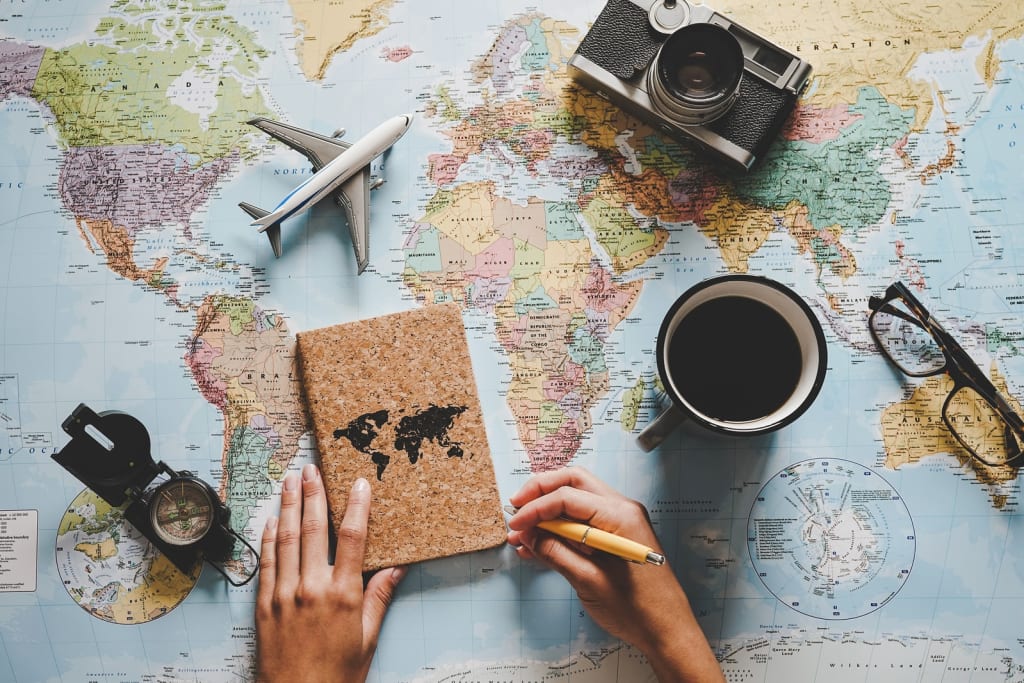
- Want a ticket worth up to $500 for free?
- Submit your answer by April 30th for a chance to win.
Language immersion benefits include being prepared for real life situations, being more aware of the culture, and being more comfortable with using the language. Keep reading for 10 ways to learn a new language through immersion without breaking the bank.
14min

It is often said that the best way to learn a language is to visit the country where that language is spoken. From personal experience, I can say that is true.
Studying a language in school is great because you learn lots of vocabulary and grammar. You'll become proficient in reading and writing in the language with a lot of practice, and you'll eventually ace your tests.
But regardless of how well you know the language on paper, you still may struggle to apply what you know to a real-life situation.
Language immersion is basically just surrounding yourself with the language as much as possible.
You can do this in a variety of ways. You can learn a language while traveling by immersing yourself in the local culture of a country where that language is spoken, you can visit a school or community where that language is spoken in your home country, or you can go to a language immersion school.
In any of these language immersion methods, you will be constantly hearing, seeing, and speaking that language.
Some language immersion schools make sure that their students are using and hearing the second language for at least 50% of the time during a class, so it is possible to engage in language immersion methods without traveling.

Language immersion is a much more intense and realistic way of learning a second language. Not only are you reading and writing in that language, but you are conversing in it, listening to music, watching TV and movies, and even thinking in it.
You are completely surrounded by the language and that helps your brain adapt to the language faster than just taking a standard class. It is a more dynamic way of learning that uses many methods and allows students to be more creative with their language learning process.
Sometimes learning complex grammar and advanced vocabulary helps students get top marks on assessments, but it doesn't always prepare them for real life. Most people's goal for learning a new language is to be able to use it in real life, so why not learn things that will actually be useful?
Immersion is good for learning a language because students can put themselves in a position that mimics that of real life.
If you visit a new country, you are surrounded by the language but also the culture. Language immersion covers not only vocabulary and grammar, but also cultural tips, history, art, and all aspects of a language.
Sometimes understanding the background and culture of a language helps make things seem more relatable and significant.

In my experience, I studied Spanish in high school for four years. I got really good grades and did really well in memorizing vocabulary. I could read and write very well in Spanish, so when I went to university I signed up to take Spanish again.
I thought I would be placed in an intermediate level since I studied for four years already. But to evaluate our language speaking abilities, we had to converse with a native speaker for about 10-15 minutes. Even though I could read and write in Spanish well, I really struggled when trying to carry out a conversation. I ended up being placed back in beginner level Spanish.
I was a bit confused at first. I have studied for years and worked so hard, yet I could still barely speak Spanish. Why was that?!
In high school classes, I was not immersed in the language enough. We took tests, looked at flashcards, played vocabulary games, and it was fun but it was not intense enough for me to learn how to speak in a conversation.
While I took my beginner-level Spanish class in university, I decided I needed to make more of an effort to immerse myself in the language. I took two trips to Spain that year so I could be in and around the language all day. I was amazed at how much more confident I felt speaking the language when I forced myself out of my comfort zone and into the thick of it.
I had to open my mouth and talk if I wanted to accomplish anything in Spain. I had to conjugate verbs in my head and be confident. If I didn't know the word for something, I had to describe it using other words until my point was clear. It was scary at first but once I got over the fear of putting myself out there, it got easier.
I was so happy with my progress in Spain that the next year I wanted to improve my Spanish even more. After discovering that I could learn Spanish for free while traveling the world, I booked a flight to Ecuador and spent the next two months there and in Peru doing work exchanges with Worldpackers.
Most of the places I volunteered were with locals who didn't speak much English, so again I had to force myself to speak Spanish all the time.
My conversational skills improved exponentially during this period. I actually felt that I learned more than I did in school during these two months in South America.
Rather than learning new complex grammar and vocabulary that I would rarely use and getting tested on it, I was practicing everyday conversation and getting more comfortable with what I already knew.
In a classroom, you are graded on your knowledge and expected to perform in a certain way. In real life, people don't care if you make mistakes or use basic grammar instead of advanced grammar as long as they can understand you. I have more success using the same easy verbs over and over rather than struggling to remember complicated verbs.
So the best thing I ever did for my Spanish speaking skills was travel. When I immersed myself in Ecuadorian culture and visited Peru through a Worldpackers work exchange program, I surrounded myself with Spanish every single day, and I had no choice but to improve.
I suggest you to read these tips about learning Spanish on your own while traveling.

You don't have to enroll in one of the many expensive language immersion schools to learn a new language. Probably the best, and cheapest way to learn a language is to travel there and surround yourself with locals.
With all the budget airfare and volunteer experiences abroad, traveling has never been cheaper. If you can live and work with locals, that is even better than staying in tourist accommodation. But as long as you are in the country, and making an effort to learn, your language skills will improve immensely.
These language immersion strategies to use while abroad are simple and straightforward. I use all of these when I practice Spanish abroad, and they can apply to any language or country.
The best part of these language immersion hacks is that they won't break the bank. Most of these strategies are mental, and they take perseverance and practice but they don't cost any money.
1. Don't be afraid to make mistakes
2. Learn about the culture
3. Listen to music and watch movies
4. Read in the language
5. Practice every day
6. Translate in your head whenever possible
7. Figure out what helps you learn
8. Keep a journal
9. Ask questions
10. Try a Worldpackers experience!
---
This is probably the most importation language immersion strategy.
Many people are afraid to use what they have learned in school in real life because they are afraid to make mistakes. Messing up in a classroom isn't a big deal because everyone is a beginner, but messing up in a local town can be scary. What will people say? Will they laugh at you? What will people think of you?
In reality, people do not care one bit if you make a mistake speaking in their language.
First of all, they will be appreciative that you are even trying. It looks a bit ignorant to visit a foreign country and only use English. Locals will respect that you are attempting to use their language, and they will most likely receive your attempts at conversation with a smile.
Sometimes, people will laugh at you if you make a ridiculous mistake, such as using an incorrect word that makes the sentence comical. This has happened to me countless times, and the best thing to do is just laugh at yourself too.
Learning a language doesn't have to be stressful! If you mess up, laugh it off and try again. Most locals will help you locate the right words and correct you respectfully, so take the pressure off yourself to be perfect and just go for it.
Learning about the local culture is a huge part of starting a new language. Sometimes you will learn specific words about the culture, and sometimes culture will just help provide context for some words.
History, culture and language all go hand in hand, so you want to learn about all three to truly master a new language. There are certain customs, mannerisms, and traditions that are linked to different languages, so you want to know as much as possible.
For example, I've visited five different Spanish speaking countries and there are different slang words in each one. The accents are different, and there are certain words associated with the culture that other countries might not have.
Spaniards often say "vale" to mean "okay", Guatemalans often throw some Mayan terms in with their Spanish, and Argentinians have an extremely unique accent. The local word for "avocado" changes from country to country.
Regardless of my Spanish speaking level, I always have to try to adapt to the local culture in different countries to really master the Spanish.
Also, you may like: How long does it take to learn a language?
Expanding your practice with a new language into the arts is a great way to continue your language learning.
You may feel a bit burnt out practicing the language all day every day, so allowing yourself to just sit back and be entertained can give you a nice break. But although it may seem like you're not practicing, your brain will still be working to understand the lyrics of a song and the dialogue of movie characters.
While traveling, spend your long bus rides listening to music in the language you are trying to learn. Find songs that intrigue you and let them play into your ears. The first few times you listen to a song, don't bother trying to translate and just relax. Feel the music, enjoy the way it sounds, and over time you'll find that you subconsciously try to translate.
Listening to Spanish music is one of my favorite methods of practicing the language. It is a low-pressure way to practice; it is all in your head and it is quite fun to try and understand the lyrics.
The same goes for movies and TV shows. One of the hardest parts of learning a new language is understanding the locals because sometimes that speak fast and have distinct dialects.
Watching movies and trying to understand the dialogue is a fun challenge. You don't have the pressure of having to respond; you can just listen and take it all in. If you really want to follow the movie without missing anything, put subtitles on and just hearing the foreign language will still give your brain a bit of a work out.
Similar to listening to music and watching movies, reading in the language helps keep your mind sharp. Pick books according to your language level and just keep the practice up. Even if that means reading a children's picture book, every bit of practice counts.
Read at any chance possible. If you are on a bus or train, read all the signs and advertisements and try to translate them. Read local menus, not English menus. Read street signs and billboards.
Language is all around us, so stay alert and constantly try to understand what you see. Sometimes you can even learn new words this way by understanding a sign through context.
Learning a new language is a skill. Just like any skill, such as learning an instrument or a sport, repetition is key. If you don't practice, you will lose your skills.
This is why spending a few weeks or more in a foreign country is amazing for language learning. In school, you maybe practice a few times a week in class, but in that country, you have to practice every single day.
Whether you are traveling or studying at home, make an effort to keep practicing even when you don't have to. Set an alarm and dedicate at least one hour every day to practicing.
You can find language tests and games online, or you can practice one of the above methods like reading, listening to music or watching movies in the language. Practicing every single day may seem extreme, but if you truly want to improve or even become fluent, you have to do it. If you just want to maintain basic skills, that is fine and you don't have to be so strict with your practice.
But for those who have higher goals for themselves, you must practice every single day. Hold yourself accountable, and know that after you complete your daily hour of practice, you'll feel good about yourself.

This language immersion method won't happen straight away when you first start learning, but it will develop over time.
As you become more proficient in the language, you'll start to translate things in your head. When you are speaking, of course, you have to translate in your head so you can have a conversation. But the more you commit yourself to learning the language, you'll find that you translate in your head even when you don't have to.
I noticed this after spending a few weeks in South America. Because I was working so hard to speak in Spanish all the time, I started constantly translating my own thoughts into Spanish. I didn't do it on purpose, but I realized that when I translate thoughts in my head, it became easier to translate sentences out loud. It is like subtle, involuntary language practice.
So if you can remember to do so, start translating in your head whenever possible. Even if you just to yourself, "I'm hungry" or "I'm tired" or "What should I do today?", try to translate those daily thoughts into the foreign language. This will prepare you for saying those phrases out loud.
Everyone learns differently. Some people are visual learners, who learn the best through slideshows, posters, reading, and any sort of visual tool. Some people are audio learners, who learn the best through listening to a teacher explain something, listening to music and any sort of audio tool. Some people are hands-on learners, who learn the best through practicing different exercises and applying the knowledge to something hands-on.
No matter what type of skill you are learning, find out what works best for you.
Notice which type of learning method helps you absorb and retain the most information. Some learning methods may bore you to death, and some may actually stimulate your brain and get you excited to learn.
When trying to learn a new language, it is important to incorporate all different types of learning methods so you can learn how to speak, read, write, and listen to people. But if a certain method of learning makes life easier for you, focus more on that method.
You will have an easier time absorbing new material, and you won't get as frustrated when something doesn't stick in your mind.
Keeping a record of your progress is a helpful way to stay on track with your language immersion practice. There are a few different ways that you can write down your progress so you continue to feel motivated and positive about your learning experience.
First of all, you can record how often you practice. Keeping a practice log acts as a good incentive to practice every day and not skip any sessions. If you write down your practices and how long they last, you can visualize your schedule and stay on track. Then if you miss a practice, you'll see that gap in your schedule and feel motivated to pick back up strong the next day.
A journal can also be helpful for writing down difficult grammar and vocabulary. If you learn a new word or a new phrase, it is easy to forget it quickly if you don't use it consistently. But if you write down that new word in your journal right after you first learn it, it is there forever. You can constantly look back on your journal and refresh your memory with that newfound knowledge and make a mental note to continue practicing it.
One of the most important tips for learning a language through immersion is to ask questions!
In a classroom setting, it is very easy to just raise your hand and ask your teacher a question. But when you are trying to learn a language through traveling or living in a foreign country, you don't have just one teacher waiting around to help you. Instead, you have to look at every single native speaker as your teacher.
When learning a new language, you will have countless new questions every day. The second you master something, you'll find there is even more to learn. When you start to question something, ask.
Ask anyone, and ask them straight away. Don't wait for the question to slip away, just be confident and voice your thoughts. Locals will always be happy to explain things to you and help you learn their language.
Something it can feel intimidating to ask questions, but don't ever be afraid of looking silly or confused. The only way to truly learn is to admit when you are feeling lost and let others guide you. Whether it is asking for the meaning of a word, or asking how to say a certain phrase, or asking for clarification that what you said is correct, always be asking native speakers for help.
This tip is especially useful for when you're traveling and you don't understand people. Even if you are proficient in a foreign language, locals tend to speak very fast and sometimes have accents that are hard to understand.
Rather than just guessing at what they said or pretending you understood, be honest. Ask them to repeat their sentence, or ask them to speak more slowly. Most of the time, locals don't mind repeating themselves if they know you are just learning and they want to help you on your journey.
If you are looking to have an immersive language learning experience abroad, a Worldpackers travel experience is an amazing way to do that.
It allows you to travel, to live in a new country and stay with locals. If you want to truly learn a new language, living with native speakers is about as immersive as you can get.
Volunteering with Worldpackers makes traveling and living abroad very easy and affordable.
If there is a specific language you want to learn or practice, you can just search for volunteer opportunities in that country. Then once you start messaging some hosts, you can mention that you want to learn the language. If you're a complete beginner, you may want to live with hosts who also speak your language so you aren't totally lost.
Also when searching for hosts on Worldpackers, use the filters on the side of the page to select hosts that offer language lessons during your stay. First, select the type of volunteer experience you want to have, and then you can see which opportunities offer language lessons as well.
Here are just a few examples: working on an eco-farm in Costa Rica, bartending in a hostel in Israel, working at a guesthouse reception desk in Malaysia, doing photography at a homestay in Senegal, or doing marketing for a school in India.
At all of these places, you can enjoy free language lessons during your stay in exchange for your work.
Write here your questions and greetings to the author
Josiane
Mar 10, 2020
Gabrielle, I really appreciate all of your tips in the text. I've already started practicing at home, I'll travel next month.
matheus
Mar 19, 2020
I can speak and writing in English only because I did that things you just mentioned
Of course it's not perfect but I can comunicate my self with anyone
Next friday I'll be in my first worldpackers experience and I'm sure that all this tips are going to help me
Phoenix
Sep 05, 2023
It's a great way to see the world and experience local culture without breaking the bank. Living with a family or a group of friends who are fluent in the target language is the next best thing to being immersed in the culture 24/7.